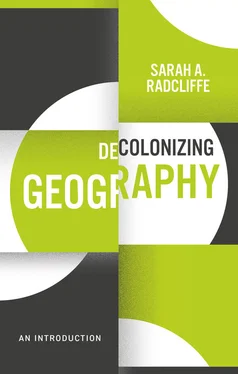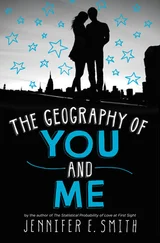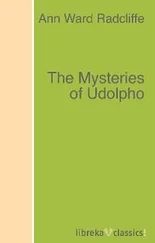Among the lessons to be learnt in a ‘North–South’ dialogue with Latin America is ‘anthropophagy’ (as the Brazilian writer Oswald de Andrade discussed in his 1928 ‘Manifesto Antropofágico’) – to receive the Other and somehow ‘swallow’ it and make something else of it. This Latin American hybridity or ‘transculturation’ (a term from the Cuban essayist Fernando Ortiz) took place in large part, of course, under the violence of colonization. But much hybridity arises from the longstanding societies and politics of original peoples who, even when forcibly transformed, bring forward decolonial proposals such as the one that opens this book, namely to build ‘a world where many worlds fit’ ( un mundo donde quepan muchos mundos , to quote the Zapatista movement). Transculturation thus allows the delineation and building of what Radcliffe calls ‘decolonial pluri-geo-graphies’. Having more than one world means accommodating non-hierarchical, diverse, worlds (a pluriverse) and overcoming divisions such as between First, Second and Third worlds.
In addition to the geographical concepts discussed in Chapter 4there is the concept of region (or regionalization processes), which carries strong Eurocentric overtones, as in the world’s division into continents. By contrast, in Brazil, Josué de Castro brings a pioneering approach for a ‘regionalization from below’ (by identifying the regionalizing of Brazil’s starving populations), focusing directly on subalternized groups. Mariátegui, the Peruvian Marxist thinker, in turn, speaks of a ‘new regionalism’ in Peru, centred around Indigenous peoples and land issues. The concept of territory similarly can be decolonized further. The concept of territory in Latin America informs critical geographical accounts because of the term’s use in struggles ‘not only for land but also for territory’, as Indigenous peoples say. As Radcliffe points out, unlike Anglophone geographies’ functional and ‘technological’ definition of territory, here territory is understood as a defensive and affirmative space of life, struggling for existence or, as Carlos Walter Porto-Gonçalves expresses it, a r-existencia (resisting in order to exist). Always in movement, territory must be seen in the multiplicity of its manifestations and overlaps, in short, as a multi- or trans-territoriality – as Guaraní peoples on the border between Paraguay, Bolivia, Brazil and Argentina claim. This existential ‘life-territory’ is evident also in Arturo Escobar’s discussion of Afro-descendant peoples in Colombia’s Pacific region. These geographies alert us to the practical and political relevance of our concepts. As Radcliffe demonstrates here, Latin American Indigenous feminists engage in political activism using the concept of body-territory, which links their ‘domain and appropriation’ over space to their own bodies (as Sofía Zaragocín indicates when proposing that the female uterus itself generates territoriality).
The ‘novelty’ of decolonial approaches is therefore not so new if we situate it in relation to diverse Indigenous and Latin American thought. Likewise it is important not to make the so-called decolonial turn into a theoretical paradigm that will impose itself with full force against other ways of thinking about space and doing geography. As Doreen Massey said, we must be very careful because tomorrow ‘our own theory’ will be questioned and surpassed. Hence decolonizing entails overcoming the idea of radical paradigm shifts and instead promotes coexistence between diverse approaches. As Radcliffe states: ‘to ensure geography transforms into a discipline appropriate for a world “where many worlds fit”, this analytical plurality is crucial. Indeed, acknowledging plural theoretical reference points is entirely fitting, being consistent with decolonial agendas to acknowledge and value multiple systems of knowledge.’
Finally, this book calls on everyone to carry out their own plural decolonization s from the spatiotemporal and geo-historical contexts in which they are situated. ‘I encourage all readers to think about this book in tandem with the local and regional decolonizing discussions where they live and work.’ Clearly recognizing the situation in which our knowledge is conceived is the first indispensable step for the construction of decolonizing dialogues with human and more-than-human Others, dialogues that expand our views of the world(s). Decolonizing is, ultimately, about proposing the challenge of new ways of building power relations, of making politics that is always spatiotemporally situated, attentive to the limits of the act of (dis)ordering space (including concerns about the rights of nature), and to all kinds of inequalities and/or differences.
In summary, this book can be read not only for its analytical vigour and innovative approach to space and geography, but also as a stimulus for action. In times as difficult as these in which we live, especially for subalternized populations in the majority world ‘periphery’, this book conveys encouragement as well as critique, dialogue as well as action. Decolonizing geography, in Sarah Radcliffe’s book, recognizes that there are many legitimate ways of reading and making space, and that our greatest struggle and challenge is to embrace this diversity of world perspectives while tackling its inequality.
Figures, Tables and Boxes
Figure 1.1‘A Surge of Power (Jen Reid)’
Figure 1.2Indigenous Los Angeles: a plaque acknowledges Indigenous peoples and places in the city
Figure 3.1 Micronesian tool for navigating by the stars
Figure 3.2 Association for Curriculum Development in Geography 1983 conference, ‘Racist society, geography curriculum’
Figure 3.3 Geographies of peace
Figure 4.1 Settler colonial geographies and Indigenous places in Oklahoma
Figure 4.2 Te Awa a Whanganui, Aotearoa-New Zealand
Figure 4.3 Lake Waikaremoana, Te Uruewa, Aotearoa-New Zealand
Table 1.1Racial disparities in UK and US geography
Table 2.1 Theoretical strands in geography’s decoloniality
Table 3.1 Decolonizing geographies: a summary
Table 6.1 What makes decolonizing research?
Table 6.2 Decolonizing research methods
Table 6.3 Codes of best practice: Indigenous and decolonial research
Box 1.1British opinion on colonial histories
Box 1.2Resisting European knowledge systems in Africa
Box 1.3Decolonizing Europe
Box 2.1Overlapping borders and identities
Box 2.2Coloniality and the who/where of knowledge
Box 2.3Connecting physical geography and postcolonial-decolonial approaches
Box 3.1Anti-racism and school geographies in the UK
Box 3.2Plantation futures: Katherine McKittrick
Box 4.1Indigenous place-making under settler colonialism: Oklahoma
Box 4.2Murdered and missing Indigenous, Black and racialized women and girls in the Americas
Box 4.3Body-territory/ Cuerpo-territorio
Box 4.4Rights of nature: rethinking nature as a legal being
Box 4.5Pluriverse: ‘a world in which many worlds fit’
Box 5.1The challenges of decolonizing a university
Box 5.2Critical race topics and geography
Box 5.3Global lives in public spaces: cultural and historical geography
Box 5.4Learning from the land
Box 6.1Short student projects: learning to decolonize
Box 6.2The novice researcher and decolonizing processes
Box 6.3Decolonizing physical geography: water catchment research
Box 6.4Sample consent form and agreement
Box 6.5Aymara Indigenous control over writing and sharing
Конец ознакомительного фрагмента.
Текст предоставлен ООО «ЛитРес».
Читать дальше












